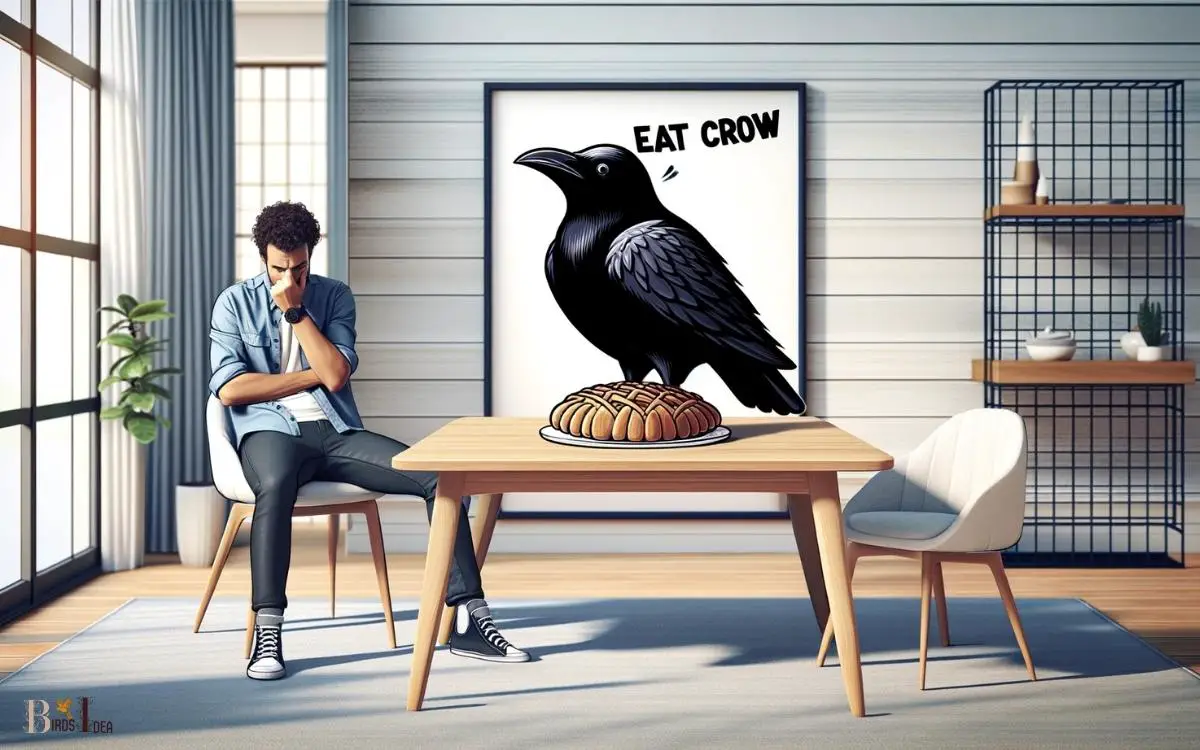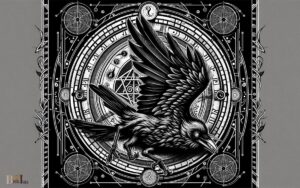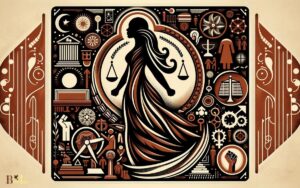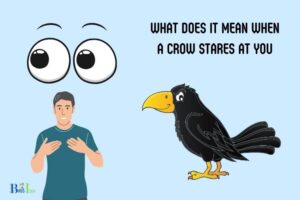What Does Eat Crow Mean: Discover!
The phrase ‘eating crow’ means having to admit wrongdoing or to humbly accept defeat or embarrassment after being proven wrong.
‘Eat crow’ is an American colloquial idiom that signifies the act of retracting one’s statement and admitting fault, often after a period of arrogance or ignorance.
It’s akin to ‘eating humble pie’ and is used to describe a situation where someone must face the unpleasant consequences of their actions or words.
Example : After boasting that his team would win the championship and then watching them lose, he had to eat crow in front of his friends.
Admitting one is wrong is never easy, but the idiom ‘eating crow’ encapsulates the humility and discomfort that come with it in a vivid, metaphorical way.

Key Takeaway
Origins of ’Eat Crow
The phrase ‘eat crow’ has its origins in American folklore and is believed to have been first used in the 19th century.
The idiom refers to the act of being humiliated by having to admit a mistake and accept the consequences.
Some sources suggest that the term may have originated from a Native American custom, in which a person who had made a serious error was forced to eat crow as a form of penance.
Another theory is that it comes from the unpleasant taste of crow meat, further emphasizing the distasteful experience of being proven wrong.
Regardless of its exact origins, ‘eat crow’ has become a widely used expression in the English language, symbolizing the discomfort of having to acknowledge one’s errors.
Historical Usage of the Phrase
During the 19th century, the compound noun ‘crow-eating’ began to gain historical significance as a symbol of public humiliation.
This phrase was often used to describe the act of being publicly shamed or forced to admit a humiliating mistake.
The historical usage of the phrase ‘eat crow’ is rooted in American culture, particularly during the Civil War and the Reconstruction era, where defeated individuals or groups were metaphorically depicted as eating crow.
The phrase has also been associated with political and military contexts, where leaders and generals were sometimes compelled to eat crow after making disastrous decisions.
Despite its negative connotations, ‘eat crow’ has also been used in a more lighthearted manner, often to describe the act of humbly accepting defeat or acknowledging one’s errors.
- Eating crow as a form of public apology
- Military leaders being forced to eat crow
- Use of the phrase in political contexts
- Lighthearted use of ‘eat crow’ in acknowledging personal errors
- Symbolic significance of ‘eating crow’
Figurative Meaning of ’Eating Crow
‘Eating crow’ involves the figurative act of publicly acknowledging and accepting one’s embarrassing or humiliating mistake.
This phrase signifies the humbling experience of admitting fault or error, especially in a public setting.
In essence, it symbolizes the willingness to face the consequences of one’s misjudgment or miscalculation. Embracing the figurative act of ‘eating crow’ requires individuals to set aside their pride and ego, which can be a challenging yet necessary endeavor for personal growth and accountability.
Similar Idioms in Different Cultures
Idioms related to acknowledging mistakes and accepting responsibility exist in various cultures worldwide.
Here are some similar idioms from different cultures:
- Chinese: ‘Chi Ku’ which translates to ‘eating bitterness’ refers to enduring hardship and persevering through difficult situations.
- Japanese: ‘Kuchisabishii’ which means ‘to eat one’s words’ signifies admitting that one’s previous statement was wrong.
- Spanish: ‘Tragar camote’ translates to ‘swallowing a yam’ and is used to describe accepting an embarrassing situation or owning up to a mistake.
- Italian: ‘Mangiare il rospo’ means ‘eating the toad’ and is used to convey the idea of admitting an unpleasant truth.
- French: ‘Bouffer du noir’ which translates to ‘eating black’ refers to feeling down or being depressed due to a mistake or failure.
Modern Usage and Interpretation
When considering the modern usage and interpretation of the phrase ‘eat crow,’ it is important to explore its origins and how it has evolved over time.
Additionally, the negative connotations associated with the expression today and the diverse cultural variations in its meaning provide valuable insight into its contemporary usage.
Origins of the Phrase
The modern usage and interpretation of the phrase ‘eating crow’ has evolved to signify the act of humbly admitting a mistake and accepting the consequences.
Despite its negative connotations, the phrase has gained a positive spin, encouraging individuals to own up to their errors.
The origins of the phrase can be traced back to American idiomatic usage, with its exact inception still a topic of debate. However, it has become a widely recognized expression in contemporary language.
The phrase has found its way into various aspects of popular culture and media, further cementing its place in modern vernacular. Its enduring relevance is a testament to the universal experience of making mistakes and the importance of taking responsibility for them.
Negative Connotations Today
Despite its negative connotations, the phrase ‘eating crow’ has gained a nuanced interpretation in modern usage, embodying the act of humbly admitting mistakes and accepting their consequences.
In today’s context, it signifies a willingness to take responsibility for one’s errors and learn from them, rather than simply enduring humiliation.
This shift in interpretation reflects a more empathetic and growth-oriented mindset in modern society, where acknowledging and rectifying mistakes is valued over preserving an untarnished image.
The table below contrasts the traditional negative connotations with the modern interpretation of ‘eating crow’, highlighting the evolving perception of this idiom.
| Traditional Connotations | Modern Interpretation |
|---|---|
| Forced to admit fault | Taking responsibility and learning |
| Public humiliation | Humble acknowledgment of mistakes |
| Unwilling compliance | Willingness to grow and improve |
Cultural Variations in Meaning
Cultural variations in the modern usage and interpretation of the phrase ‘eating crow’ reveal shifting attitudes towards acknowledging mistakes and taking responsibility.
In different cultures and modern contexts, the act of eating crow can carry diverse connotations:
- Humility and Accountability: Some view eating crow as a symbol of humility and taking accountability for one’s actions.
- Public Apology: In certain cultures, eating crow may signify making a public apology or rectifying a public mistake.
- Accepting Defeat: It can also represent gracefully accepting defeat or acknowledging being wrong.
- Personal Growth: For some, eating crow reflects personal growth and the willingness to learn from errors.
- Self-Deprecation: In other instances, it may be seen as a form of self-deprecation, emphasizing the humor in admitting fault.
These variations highlight the evolving perspectives on admitting and rectifying errors in diverse cultural contexts.
Cultural Impact and Relevance
Exploring the historical origins and contemporary usage of the idiom ‘eating crow’ reveals its enduring impact and relevance in modern society.
The phrase has transcended its literal meaning to symbolize the act of admitting one’s mistakes and humbly accepting the consequences.
Its cultural impact is evident in various facets of society, from politics and business to everyday interactions.
In a society that values accountability and authenticity, the concept of ‘eating crow’ resonates strongly. It serves as a reminder of the importance of honesty, humility, and learning from one’s errors.
Furthermore, its relevance extends to popular culture, where the idiom is often used in literature, film, and media to convey themes of redemption and personal growth.
As such, ‘eating crow’ continues to hold significance in contemporary discourse, emphasizing the timeless lessons of self-reflection and integrity.
Conclusion
The phrase ‘eat crow’ has a long history and deep cultural significance. Its figurative meaning of accepting humiliation or defeat is widely used in modern language and has a powerful impact on the way people perceive failure.
The phrase holds a weighty emotional significance, as it evokes a feeling of extreme embarrassment and shame, making it a potent symbol of humility and accountability.






